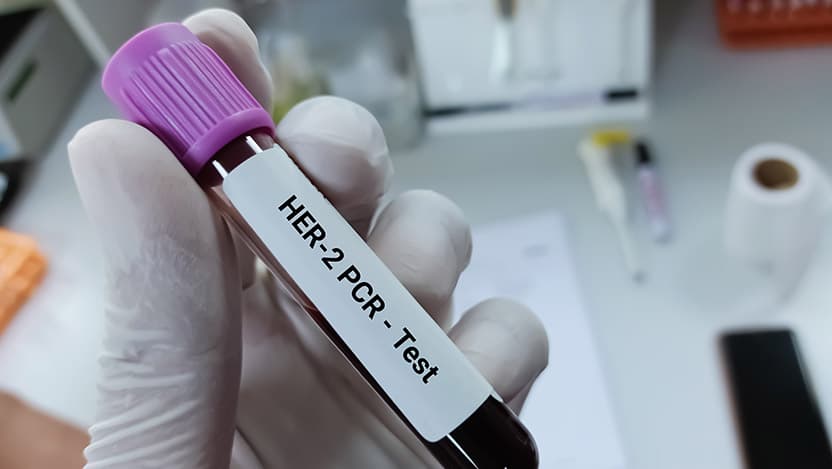Racial and ethnic disparities in breast cancer treatment outcomes: How to improve?

Racial and ethnic disparities are major concerns in terms of breast cancer treatment outcomes in the United States.
“Addressing these disparities would lead to better survival outcomes, especially in Black patients who have higher death rates,” said March 30 in the journal JAMA Network Open.
“We found remarkable differences in response to breast cancer chemotherapy among Asian and Pacific Islander, Hispanic, non-Hispanic White and Black patient groups. And these observations came from a large population study of 107,207 patients with stage I to III breast cancer,” said Huo.
In a subsequent study, Huo and colleagues asked if genetic markers could identify a particular set of people who don't respond to regular treatments and need personalized treatments.
Detailed genetic analysis revealed that a subset of Black patients who expressed biomarkers such as hormone receptor negative (HR-) and human epidermal growth factor receptor -2 positive (HER2+) responded poorly to standard treatment compared to their white counterparts.
Usually, achieving pathological complete response (pCR) to NACT therapy — meaning the disappearance of all cancer cells from breast tissue with NACT therapy — is predictive of overall survivability.
The treatment outcomes to NACT therapy can be different from patient to patient based on their genetic makeup. To study the genetic variations that contribute differences to NACT treatment, UChicago Medicine researchers selected 690 patients with advanced breast cancer from the Chicago Multiethnic Epidemiologic Breast Cancer Cohort (ChiMEC), a database of breast cancer cases diagnosed at UChicago Medicine that are studied over a long period of time.
In their further analysis, they saw that Black patients with HER2+ had genetic alterations in the genes in the downstream of HER2+ pathway which makes them insensitive to the therapy. Although this information is useful to treat this group of patients differently, there is a skepticism moving forward with this idea, said first author Sarah Shubeck, MD, MS, Assistant Professor of Surgery at the University of Chicago Medicine. That's mainly because of the smaller size of the study as the data was from only the University of Chicago Medical Center, said Shubeck.
In this study, when the team analyzed 107,207 patients with breast cancer who received NACT therapy, Black patients with HR-/HER2+ had the lowest pCR response rate (44.8%) while Asian and Pacific Islander patients achieved the highest response rate (56.8%), which confirmed the observations of the smaller Chicago study.
“However, this type of trend was not observed with other tumor subtypes such as HR+/HER2- or triple-negative breast cancer and warrants further studies to better explain the reasons for racial and ethnic disparities in advanced breast cancer treatment outcomes,” said Shubeck.
“Apart from the biological factors, there are several reasons such as access to care, type and duration of the treatment, and quality of care that they have received that might have contributed to the poor outcomes in Black patients,” said Shubeck.
Addressing these issues first and then looking at the biological factors that contribute to the differences in treatment outcomes would yield better results, she added.
The study “Response to Treatment, Racial and Ethnic Disparity, and Survival in Patients With Breast Cancer Undergoing Neoadjuvant Chemotherapy in the US” was supported by the Breast Cancer Research Foundation, Susan G. Komen for the Cure, and the National Cancer Institute (NCI).
Additional authors include Fangyuan Zhao, MA, Frederick Howard, MD, and Olufunmilayo Olopade, MD, from the University of Chicago.
The study “
“Addressing these disparities would lead to better survival outcomes, especially in Black patients who have higher death rates,” said March 30 in the journal JAMA Network Open.
“We found remarkable differences in response to breast cancer chemotherapy among Asian and Pacific Islander, Hispanic, non-Hispanic White and Black patient groups. And these observations came from a large population study of 107,207 patients with stage I to III breast cancer,” said Huo.
In a subsequent study, Huo and colleagues asked if genetic markers could identify a particular set of people who don't respond to regular treatments and need personalized treatments.
Detailed genetic analysis revealed that a subset of Black patients who expressed biomarkers such as hormone receptor negative (HR-) and human epidermal growth factor receptor -2 positive (HER2+) responded poorly to standard treatment compared to their white counterparts.
Treatment for breast cancer
In locally advanced breast cancers, where surgical removal of the tumor tissue is the only option, a patient typically receives chemotherapy before surgery to shrink the tumor size. This treatment is called neoadjuvant chemotherapy (NACT).Usually, achieving pathological complete response (pCR) to NACT therapy — meaning the disappearance of all cancer cells from breast tissue with NACT therapy — is predictive of overall survivability.
The treatment outcomes to NACT therapy can be different from patient to patient based on their genetic makeup. To study the genetic variations that contribute differences to NACT treatment, UChicago Medicine researchers selected 690 patients with advanced breast cancer from the Chicago Multiethnic Epidemiologic Breast Cancer Cohort (ChiMEC), a database of breast cancer cases diagnosed at UChicago Medicine that are studied over a long period of time.
Racial and ethnic disparities on NACT outcomes
"We found a greater racial disparity in pCR in patients who have a HR-/HER2+ breast cancer. It was remarkable to see 74% of white patients achieved pCR, whereas only 41% in Black counterparts in HR-/HER+ population," said Huo. "This kind of disparity was not obvious with other conditions like HR+/HER2- or triple-negative breast cancer."In their further analysis, they saw that Black patients with HER2+ had genetic alterations in the genes in the downstream of HER2+ pathway which makes them insensitive to the therapy. Although this information is useful to treat this group of patients differently, there is a skepticism moving forward with this idea, said first author Sarah Shubeck, MD, MS, Assistant Professor of Surgery at the University of Chicago Medicine. That's mainly because of the smaller size of the study as the data was from only the University of Chicago Medical Center, said Shubeck.
Social and economic factors on treatment outcomes
To confirm the disparities that were observed in the Chicago study, Huo and team conducted a parallel analysis with a large data set obtained from the National Cancer Data Base (NCDB) — a clinical oncology database that captures approximately 70% of all newly diagnosed breast cancer cases in the United States.In this study, when the team analyzed 107,207 patients with breast cancer who received NACT therapy, Black patients with HR-/HER2+ had the lowest pCR response rate (44.8%) while Asian and Pacific Islander patients achieved the highest response rate (56.8%), which confirmed the observations of the smaller Chicago study.
“However, this type of trend was not observed with other tumor subtypes such as HR+/HER2- or triple-negative breast cancer and warrants further studies to better explain the reasons for racial and ethnic disparities in advanced breast cancer treatment outcomes,” said Shubeck.
“Apart from the biological factors, there are several reasons such as access to care, type and duration of the treatment, and quality of care that they have received that might have contributed to the poor outcomes in Black patients,” said Shubeck.
Addressing these issues first and then looking at the biological factors that contribute to the differences in treatment outcomes would yield better results, she added.
The study “Response to Treatment, Racial and Ethnic Disparity, and Survival in Patients With Breast Cancer Undergoing Neoadjuvant Chemotherapy in the US” was supported by the Breast Cancer Research Foundation, Susan G. Komen for the Cure, and the National Cancer Institute (NCI).
Additional authors include Fangyuan Zhao, MA, Frederick Howard, MD, and Olufunmilayo Olopade, MD, from the University of Chicago.
The study “

Breast Cancer Care
Our team represents expertise across the spectrum of breast cancer care: breast imaging, breast surgery, medical and radiation oncology, plastic and reconstructive surgery, lymphedema treatment, clinical genetics, pathology and nursing. Our comprehensive care approach optimizes chances of survival and quality of life.
Learn more about UChicago Medicine breast cancer care.